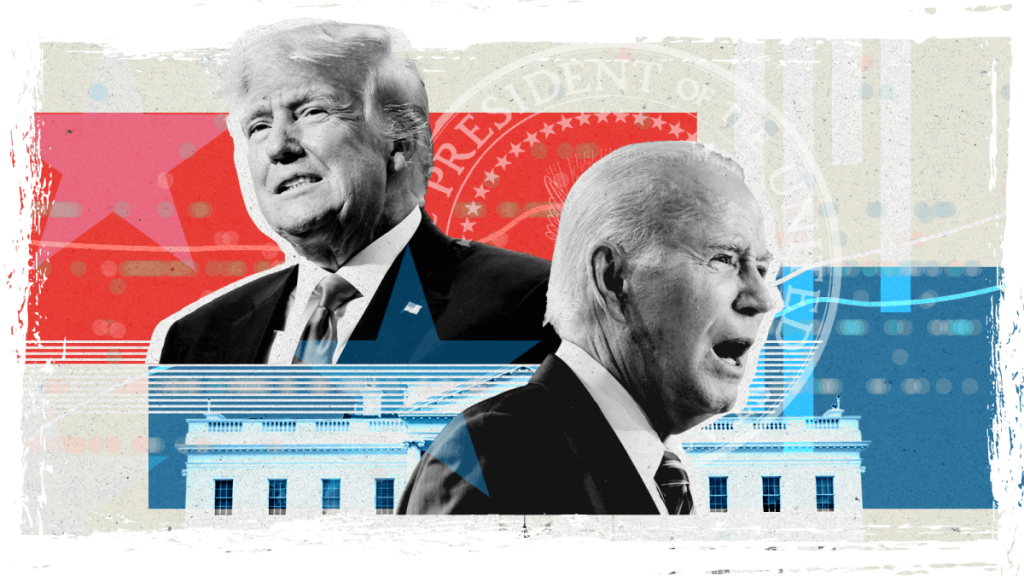The 2024 US Presidential Election: A Pivotal Moment for American Democracy
The 2024 US Presidential Election: A Pivotal Moment for American Democracy
The upcoming 60th US presidential election in 2024 is set to be a defining moment in American history. The nation finds itself in a state of unease, grappling with concerns over eroding democracy and the looming threat of authoritarianism. This article will delve into the unique dynamics of the election, highlighting the unprecedented circumstances and stark choices that lie ahead for voters. From the potential clash between the oldest president in US history and a former president facing criminal charges to the simmering divisions on crime, immigration, race, foreign wars, and the cost of living, the 2024 election promises to be unlike any other.
A Turbulent Political Era
The US political landscape entered a new era of turbulence with the shocking victory of Donald Trump over Hillary Clinton in the 2016 election. As a businessman and reality TV star, Trump became the first president with no prior political or military experience. His presidency was marred by the Covid-19 pandemic and culminated in a bitter defeat to Joe Biden in the 2020 election. However, Trump’s refusal to accept the result and his subsequent attempts to overturn it led to a deadly riot at the US Capitol, his second impeachment, and an ongoing quest for revenge.
Trump’s Legal Battles and Political Comeback
As Trump gears up for the 2024 election, he faces a series of criminal charges in multiple jurisdictions. The former president is set to stand trial on 91 criminal charges, including allegations of attempting to undermine democracy and subvert national security. Trump’s legal troubles present a unique challenge for his campaign, as regaining the White House might be his best hope of avoiding prison. This calculus could potentially make him and his supporters more desperate and volatile than ever before.
The Impending Collision: Legal and Electoral Calendars
The intersection of Trump’s legal battles and the electoral calendar sets the stage for a dramatic showdown. Trump must first secure the Republican nomination, competing against contenders such as Ron DeSantis and Nikki Haley. However, his courtroom appearances loom large. On January 16, a day after the Iowa caucuses kick off the Republican nomination process, Trump faces a defamation trial brought by writer E Jean Carroll. Additionally, he is due in court on March 4 in a federal case related to the 2020 election outcome. These legal challenges coincide with crucial primary dates, including Super Tuesday, which could significantly impact the trajectory of the election.
Turning the Tables: Trump’s Political Advantage
Despite his legal troubles, Trump continues to maintain a strong base of support. Opinion polls, albeit early in the election cycle, suggest that Trump currently leads Biden in hypothetical matchups. The Wall Street Journal poll showed Trump ahead by four points (47% to 43%) and extended his lead to six points (37% to 31%) when accounting for potential third-party and independent candidates. Biden’s defenders find these figures bewildering, considering his accomplishments in creating jobs, driving economic growth, passing significant legislation, and leading the western alliance against Russian aggression in Ukraine. However, Biden’s messaging and the Democratic party’s ability to effectively communicate their achievements have been lackluster compared to their Republican counterparts.
The Challenge of Biden’s Second Term
As Biden contemplates a second term, he faces several obstacles that could undermine his chances of success. The president’s approval rating has remained low since the botched withdrawal from Afghanistan in 2021. He also grapples with record numbers of migrants entering the country, an issue that increasingly frustrates states beyond the US-Mexico border. Biden’s handling of the Israeli-Palestinian conflict and rising inflation further erode his support among progressives and young voters. Despite his domestic accomplishments and leadership on the global stage, Biden has struggled to convey a sense of optimism and inspire the public in the same way as previous Democratic presidents.
Abortion Rights: A Key Factor
One potential advantage for Biden and the Democrats lies in their focus on abortion rights. As opinion polls indicate, most Americans do not favor strict limits on reproductive rights. The Democratic party plans to make abortion a central issue in the 2024 campaign, hoping to mobilize women and independent voters who are concerned about threats to these rights. By enshrining access to abortion in state constitutions, Democrats aim to increase support among key demographics.
The Call for Aggressive Messaging

To overcome the challenges he faces, Biden must adopt a more aggressive approach to messaging. Setting the narrative and highlighting the contrast between a Biden America and a Trump America will be crucial. The president and his campaign team must leverage the power of incumbency, the bully pulpit, and their record of achievements. By effectively showcasing their accomplishments and framing the election as a choice between two starkly different futures, they can engage voters and inspire support.
The Age Factor and Future Leadership
Biden’s age has been a persistent concern throughout his presidency and is likely to be a factor in the 2024 election. At 86 years old upon the completion of a potential second term, questions arise about his ability to lead effectively. Some Democrats privately express the wish that Biden had declared his mission accomplished after the 2022 midterm elections, paving the way for younger contenders like Pete Buttigieg, Kamala Harris, Gavin Newsom, and Gretchen Whitmer. However, it appears too late for a leadership transition at this stage.
The Fragility of American Democracy

The 2024 US presidential election unfolds against a backdrop of deep political polarization, conspiracy theories, surging gun violence, and rising antisemitism and Islamophobia. The political climate has increasingly framed opponents as mortal enemies, heightening the risk of violence. While some experts caution against predicting widespread violence, there is a genuine concern about the fraying of American democracy. The erosion of trust in the electoral process and the demonization of political opponents pose significant challenges to the nation’s stability and future.
Conclusion
The 2024 US presidential election is poised to be a pivotal moment in American democracy. With the potential clash between an aging president and a former president facing criminal charges, the choice before voters is stark. The campaign will unfold in a climate of deep divisions, simmering danger, and uncertainty. As the nation grapples with the challenges of eroding democracy, the looming threat of authoritarianism, and the need for effective leadership, the outcome of the 2024 election will shape the course of American history.



